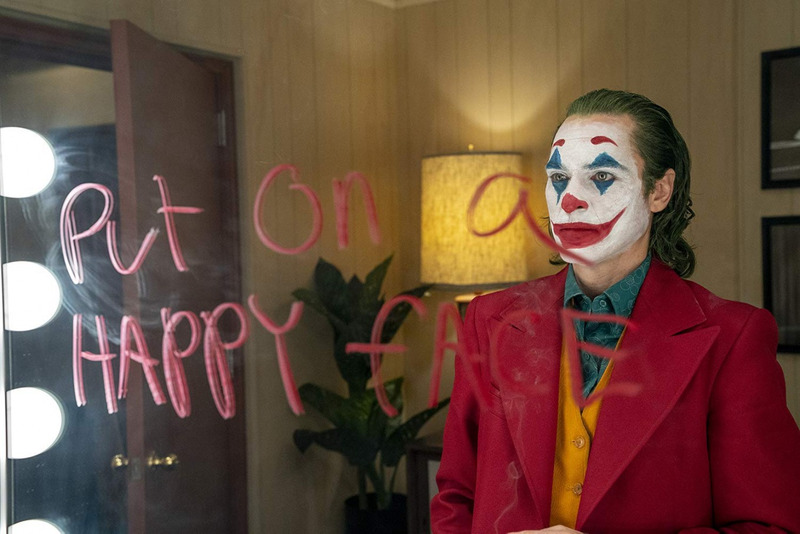Popular Reads
Top Results
Can't find what you're looking for?
View all search resultsPopular Reads
Top Results
Can't find what you're looking for?
View all search results'Joker': A gritty urban character study that can’t live up to its hype
The problem is not that Joker is too ambitious but rather its self-congratulatory nature in tackling its theme.
Change text size
Gift Premium Articles
to Anyone
A
mid all the bad things in the world at the moment, superhero movies provide a platform that not only offers a small amount of entertainment, but also a semblance of hope. Superhero movies remind us that maybe someday a group of people, with or without superpowers, will come and save the world.
What is fascinating about superhero movies is their ability to unite all kinds of people from every generation and race even when, ironically, the higher authority fails to do so. However, as hopeful and uniting, if not relevant, as they may be, in the end superhero movies are merely a fiction, a fantastical fable that we may never achieve in reality.
It is the cold, gritty version of reality that is the main background in Todd Phillips’ Joker. The movie is a dark yet formulaic moral decay tale about a beaten-down, mentally ill man descending into madness in an unhealthy, toxic society that strips away all the comfort one could ever hope for.
Joker is a visually claustrophobic villain’s origin story that subverts the conventional superhero tropes by leaning into and unleashing a real, universal problem instead of furnishing its story with hope. While Todd Phillips and his cowriter Scott Silver’s efforts at deconstructing the mainstream superhero formula is at times bold and provocative, if not refreshing, Joker falls flat and bites off more than it can chew.
What makes Joker fall short of its hype is that it never really finds a momentum that coherently bridges the titular character’s psychological examination and the broader sociopolitical issues that it addresses. As a result, whatever point Phillips is aiming to make, the movie fails to find the real nuance required to make the exploration of the subject a lot more compelling than it potentially could have been.
Just like how it is advertised, Joker operates as a gritty character study and an origin story of one of the most mythologized villains in the history of pop culture, known only as Joker, the arch-nemesis of Batman. But in the movie, before he and the world can identify him as Joker, he is just Arthur Fleck, a mentally ill man living in Gotham who has a unique psychotic condition that makes him laugh uncontrollably whenever he is nervous or afraid.
Arthur, who lives with his half-crazed mother Penny Fleck (played by the underrated Frances Conroy), works in a small company that offers clowns for rent. However, he has always dreamed of becoming a famous stand-up comic, even though everyone, including himself, knows that he is not remotely funny. When he is not working, he spends his time with a social worker, talking about his condition and struggle living as a former institutionalized man.
"Is it just me or are things getting crazier out there?" Arthur asks at one point in the movie. As cliché as it is, the answer is “both”, and through a series of horrific scenes, the film unsubtly responds that, yes, both Arthur and his world are getting crazier every minute.
Arthur’s life, in short, is just a series of very unfortunate events. He’s constantly beaten and blamed for something he is not responsible for. People laugh at him every day, while the only thing that potentially could have kept him sane is being cut off by the city. As the film crescendos into a violent end, we can all predict the few remaining knots that tie Arthur’s sanity are about to get loosened. Not only does he begin to use violence as a survival mechanism, he also starts to create an illusion to justify his actions.
This examination of Arthur’s psychotic breakdown is supposed to make a compelling argument on how dangerous it is to abandon mental health treatment, and for quite a while, when the film takes a myopic look at Arthur’s condition, the point is well delivered.
However, Joker is never just about Arthur, but also Gotham – both its seedy, underbelly and its apathetic upper-class. Therein lies Joker’s fatal failure: the film’s attempt at depicting Gotham as a toxic city is never compelling. There is just not enough well-built momentum to bridge Arthur’s psychological examination with broader sociopolitical aspects. As a result, Arthur’s evolution into Joker ends up being reduced to another portrait of a sad sack white male who is entitled to special treatment and cannot process rejection well enough.
The problem is not that Joker is too ambitious but rather its self-congratulatory nature in tackling its theme. In fact, the only thing that deserves praise is Joaquin Phoenix’s vulnerable yet menacing performance. Nonetheless, any time the film begins a forceful exploration of its masterful themes, it ends up diverting to something else that is not integral to the bigger picture. All the enthralling talk revolving around mental illness and class struggle are simplified into an all caps idea that has little to say beyond the basics. (dev/kes)











